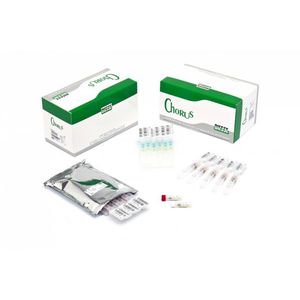
- Laboratory
- Laboratory medicine
- Syphilis test kit
- Diesse Diagnostica Senese

- Products
- Catalogs
- News & Trends
- Exhibitions
Syphilis assay kit 81 seriesIgMIgGTreponema pallidum
Add to favorites
Compare this product
Characteristics
- Applications
- syphilis
- Tested parameter
- IgM, IgG
- Micro-organism
- Treponema pallidum
- Sample type
- serum
- Analysis mode
- ELISA
- Result display time
50 min
- Specificity
100 %
- Sensitivity
100 %
Description
The serological diagnosis of syphilis is performed by demonstrating the presence of significant levels of specific Treponema pallidum (TP) antibodies in the serum sample. The reference method used is the FTA-ABS technique but its execution is laborious and the interpretation of the results is not simple; alternative methods have therefore been introduced to simplify the procedure. The TPHA test is the preferred technique for screening purposes, in as far as it detects specific Ig even at low titers. Unfortunately, the result of the test is determined by subjective interpretation as the test cannot be completely automated. The TPHA test is not sensitive in the primary phase. The kits allows screening with the ELISA method. It reveals the presence of specific antibodies of any class, and can be completely automated. The specific assay of IgM as opposed to IgG is of particular importance in the diagnosis of congenital Syphilis.
Method:
Immunoenzymatic method for the qualitative determination of IgG and IgM-class antibodies to Treponema pallidum and immunoglobulins to Syphilis in human serum, using a disposable device applied on the Chorus and Chorus TRIO instruments.The test is based on the ELISA principle (Enzyme Linked ImmunoSorbent Assay) which uses the reaction between the antibodies present in the tested sample and the immobilized antigen bound to solid phases.The immunoglobulins bind to the antigen through incubation with diluted human serum.The disposable devices contain all the reagents to perform the test when applied on the Chorus instruments. The results is expressed as an INDEX (ratio between the OD value of the sample and that of the Cut-off).
Catalogs
Catalog 2017
54 Pages
Exhibitions
Meet this supplier at the following exhibition(s):

Related Searches
- Assay kit
- Blood assay kit
- Serum assay kit
- Immunoassay assay kit
- Plasma assay kit
- Infectious disease detection kit
- Blood rapid diagnostic test
- Rapid lateral flow test
- Immunoassay rapid diagnostic test
- Cassette rapid diagnostic test
- Virus rapid diagnostic test
- Respiratory infection test kit
- Clinical assay kit
- Whole blood rapid diagnostic test
- ELISA assay kit
- Rapid respiratory infection test
- IgG test kit
- COVID-19 rapid diagnostic test
- Feces test kit
- Influenza A assay kit
*Prices are pre-tax. They exclude delivery charges and customs duties and do not include additional charges for installation or activation options. Prices are indicative only and may vary by country, with changes to the cost of raw materials and exchange rates.


















